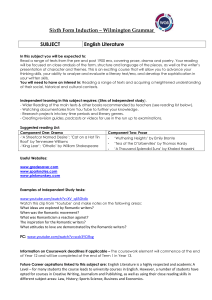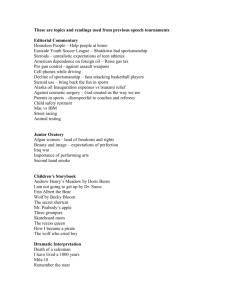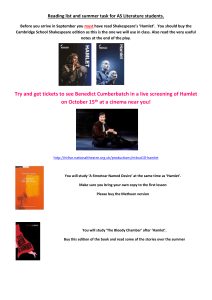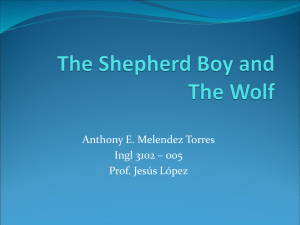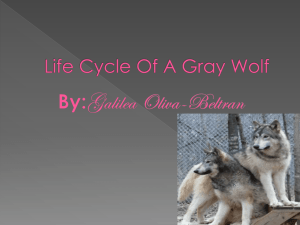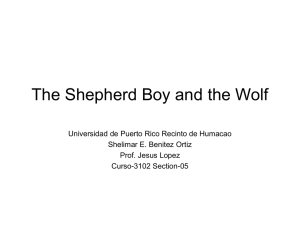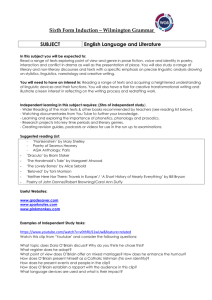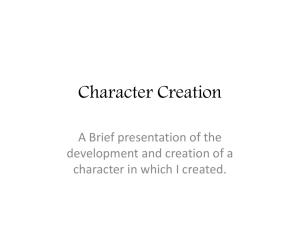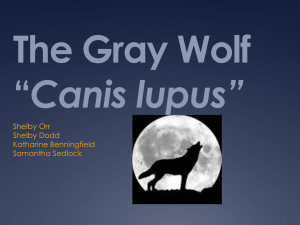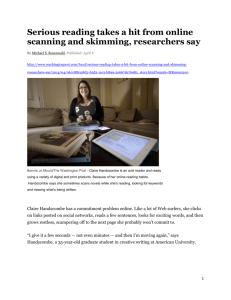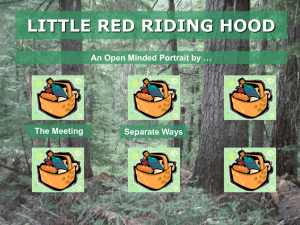CarolAnnDuffyPoems1
advertisement
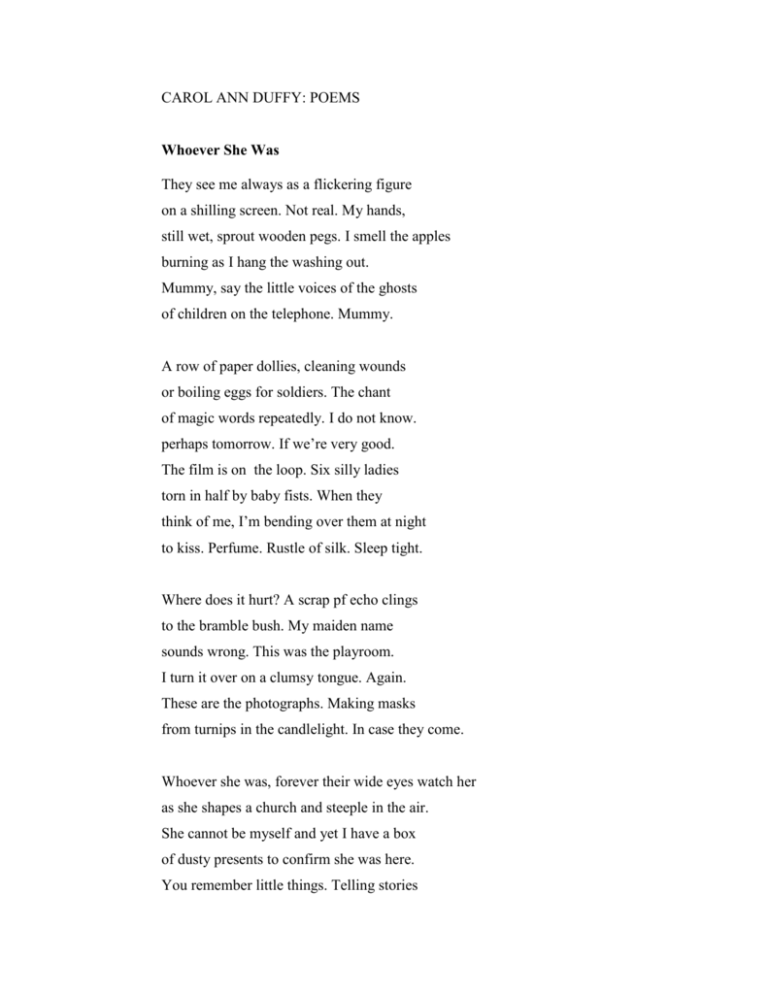
CAROL ANN DUFFY: POEMS Whoever She Was They see me always as a flickering figure on a shilling screen. Not real. My hands, still wet, sprout wooden pegs. I smell the apples burning as I hang the washing out. Mummy, say the little voices of the ghosts of children on the telephone. Mummy. A row of paper dollies, cleaning wounds or boiling eggs for soldiers. The chant of magic words repeatedly. I do not know. perhaps tomorrow. If we’re very good. The film is on the loop. Six silly ladies torn in half by baby fists. When they think of me, I’m bending over them at night to kiss. Perfume. Rustle of silk. Sleep tight. Where does it hurt? A scrap pf echo clings to the bramble bush. My maiden name sounds wrong. This was the playroom. I turn it over on a clumsy tongue. Again. These are the photographs. Making masks from turnips in the candlelight. In case they come. Whoever she was, forever their wide eyes watch her as she shapes a church and steeple in the air. She cannot be myself and yet I have a box of dusty presents to confirm she was here. You remember little things. Telling stories Or pretending to be strong. Mummy’s never wrong. You open your dead eyes to look in the mirror Which they are holding to your mouth. ORIGINALLY We came from our own country in a red room which fell through the fields, our mother singing our father's name to the turn of the wheels. My brothers cried, one of them bawling Home, Home, as the miles rushed back to the city, the street, the house, the vacant rooms where we didn't live any more. I stared at the eyes of a blind toy, holding its paw. All childhood is an emigration. Some are slow, leaving you standing, resigned, up an avenue where no one you know stays. Others are sudden. Your accent wrong. Corners, which seem familiar, leading to unimagined, pebble-dashed estates, big boys eating worms and shouting words you don't understand. My parents' anxiety stirred like a loose tooth in my head. I want our own country, I said. But then you forget, or don't recall, or change, and, seeing your brother swallow a slug, feel only a skelf of shame. I remember my tongue shedding its skin like a snake, my voice in the classroom sounding just like the rest. Do I only think I lost a river, culture, speech, sense of first space and the right place? Now, Where do you come from? strangers ask. Originally? And I hesitate. EDUCATION FOR LEISURE Today I am going to kill something. Anything. I have had enough of being ignored and today I am going to play God. It is an ordinary day, a sort of grey with boredom stirring in the streets I squash a fly against the window with my thumb. we did that at school. Shakespeare. It was in another language and now the fly is in another language. I breathe out talent on the glass to write my name. I am a genius. I could be anything at all, with half the chance. But today I am going to change the world. something's world. The cat avoids me. The cat knows I am a genius, and has hidden itself. I pour the goldfish down the bog. I pull the chain. I see that it is good. The budgie is panicking. Once a fortnight, I walk the two miles into town For signing on. They don't appreciate my autograph. There is nothing left to kill. I dial the radio and tell the man he's talking to a superstar. he cuts me off. I get our bread-knife and go out. the pavements glitter suddenly. I touch your arm. OPPENHEIM’S CUP AND SAUCER She asked me to luncheon in fur. Far from the loud laughter of men, our secret life stirred. I remember her eyes, the slim rope of her spine. This is your cup, she whispered, and this is mine. We drank the sweet hot liquid and talked dirty. And she undressed me, her breasts were a mirror and there were mirrors in the bed. She said Place your legs around my nec, that’s right. Yes. SMALL FEMALE SKULL With some surprise, I balance my small female skull in my hands. What is it like? An ocarina? Blow in its eye. It cannot cry, holds its breath only as long as I exhale, mildly alarmed now, into the hole where the nose was, press my ear to its grin. A vanishing sigh. For some time, I sit on the lavatory seat with my head in my hands, appalled. It feels much lighter than I’d thought; the weight of a deck of cards, a slim volume of verse, but with something else, as though it could levitate. Disturbing. So why do I kiss it on the brow, my warm lips to its papery bone, and take it to the mirror to ask for a gottle of geer? I rinse it under the tap, watch dust run away, like sand from a swimming cap, then dry it – firstborn – gently with a towel. I see the scar where I fell for sheer love down treacherous stairs, and read that shattering day like braille. Love, I murmur to my skull, then, louder, other grand words, shouting the hollow nouns in a white-tiled room. Downstairs they will think I have lost my mind. No. I only weep into these two holes here, or I’m grinning back at the joke, this is a friend of mine. See, I hold her face in trembling, passionate hands. PRAYER Some days, although we cannot pray, a prayer utters itself. So, a woman will lift her head from the sieve of her hands and stare at the minims sung by a tree, a sudden gift. Some nights, although we are faithless, the truth enters our hearts, that small familiar pain; then a man will stand stock-still, hearing his youth in the distant Latin chanting of a train. Pray for us now. Grade 1 piano scales console the lodger looking out across a Midlands town. Then dusk, and someone calls a child's name as though they named their loss. Darkness outside. Inside, the radio's prayer Rockall. Malin. Dogger. Finisterre. Little Red-cap At childhood’s end, the houses petered out into playing fields, the factory allotments kept, like mistresses, by kneeling married men, the silent railway line, the hermit’s caravan, till you came at last to the edge of the woods, It was there that I first clapped eyes on the wolf. He stood in a clearing, reading his verse out loud in his wolfy drawl, a paperback in his hairy paw, red wine staining his bearded jaw. What big ears he had! What big eyes he had! What teeth! In the interval, I made quite sure he spotted me, sweet sixteen, never been, babe, waif, and bought me a drink, my first. You might ask why. Here’s why. Poetry. The Wolf, I knew, would lead me deep into the woods, away from home, to a dark tangled thorny place lit by the eyes of owls. I crawled in his wake, my stockings ripped to shreds, scraps of red from my blazer snagged on twig and branch, murder clues. I lost both shoes but got there, wolf’s lair, better beware. Lesson one that night, breath of the wolf in my ear, was the love poem. I clung till dawn to his thrashing fur, for what little girl doesn’t dearly love a wolf? Then I slid from between his heavy matted paws and went in search of a living bird – white dove- which flew, straight from my hands to his open mouth. One bite, dead. How nice, breakfast in bed, he said, licking his chops. As soon as he slept, I crept to the back of the lair, where a whole wall was crimson, gold, aglow with books. Words, words were truly alive on the tongue, in the head, warm, beating, frantic, winged; music and blood. But then I was young – and it took ten years in the woods to tell that a mushroom stoppers the mouth of a buried corpse, that birds are the uttered thought of trees, that a greying wolf howls the same old song at the moon, year in, year out, season after season, sane rhyme, same reason. I took an axe to a willow to see how it wept. I took an axe to a salmon to see how it leapt. I took an axe to the wolf as he slept, one chop, scrotum to throat, and saw the glistening, virgin white of my grandmother's bones. I filled his belly with stones. I stitched him up. Out of the forest I come with my flowers, singing, all alone. MRS LAZARUS I had grieved. I had wept for a night and a day over my loss, ripped the cloth I was married in from my breasts, howled, shrieked, clawed at the burial stones until my hands bled, retched his name over and over again, dead, dead. Gone home. Gutted the place. Slept in a single cot, widow, one empty glove, white femur in the dust, half. Stuffed dark suits into black bags, shuffled in a dead man's shoes, noosed the double knot of a tie around my bare neck, gaunt nun in the mirror, touching herself. I learnt the Stations of Bereavement, the icon of my face in each bleak frame; but all those months he was going away from me, dwindling to the shrunk size of a snapshot, going, going. Till his name was no longer a certain spell for his face. The last hair on his head floated out from a book. His scent went from the house. The will was read. See, he was vanishing to the small zero held by the gold of my ring. Then he was gone. Then he was legend, language; my arm on the arm of the schoolteacher-the shock of a man's strength under the sleeve of his coatalong the hedgerows. But I was faithful for as long as it took. Until he was memory. So I could stand that evening in the field in a shawl of fine air, healed, able to watch the edge of the moon occur to the sky and a hare thump from a hedge; then notice the village men running towards me, shouting, behind them the women and children, barking dogs, and I knew. I knew by the sly light on the blacksmith's face, the shrill eyes of the barmaid, the sudden hands bearing me into the hot tang of the crowd parting before me. He lived. I saw the horror on his face. I heard his mother's crazy song. I breathed his stench; my bridegroom in his rotting shroud, moist and dishevelled from the grave's slack chew, croaking his cuckold name, disinherited, out of his time.
